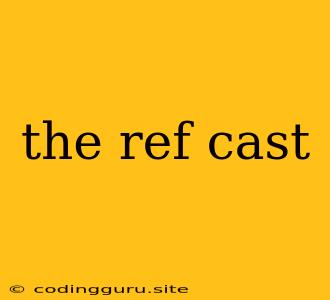Understanding the "ref" Cast in Programming
The world of programming can be a complex one, filled with a multitude of concepts and techniques. One such concept that often leads to confusion among programmers is the "ref" cast. This seemingly simple term often hides a deeper meaning, depending on the programming language you're using. So, let's delve into the world of "ref" casts and understand what they are and how they function in different programming contexts.
What does "ref" mean?
At its core, "ref" stands for reference. In the context of programming, a reference is a way of accessing data without directly manipulating the underlying memory location. It's like having a pointer to a specific piece of information, allowing you to interact with it without knowing its exact address in memory.
Why use "ref" casts?
The primary reason for using "ref" casts is to modify the original value of a variable. When you pass a variable to a function without using "ref", the function receives a copy of the variable's value. Any changes made to the variable within the function will only affect the copy and not the original variable.
However, by using a "ref" cast, you're passing the actual memory address of the variable. This allows the function to directly manipulate the original data stored in that memory location.
Example of "ref" in C#
Let's consider a simple C# example to illustrate this:
public static void ModifyValue(ref int number) {
number = 100;
}
public static void Main(string[] args) {
int myNumber = 50;
// Pass the variable by reference
ModifyValue(ref myNumber);
// The original variable is modified
Console.WriteLine(myNumber); // Output: 100
}
In this example, the ModifyValue function takes an integer variable by reference using the ref keyword. Inside the function, the value of number is changed to 100. Since we passed the variable by reference, the original myNumber variable is also modified, and the output will be 100.
"ref" vs. "out" in C#
It's important to note that C# has another keyword called "out" which is often confused with "ref". While both "ref" and "out" allow you to modify the original value of a variable, they have key differences:
- ref: The variable must be initialized before passing it to the function. The function can both read and write to the variable.
- out: The variable does not need to be initialized before passing it to the function. The function is obligated to assign a value to the variable before returning.
"ref" in other languages
The use of "ref" is not exclusive to C#. Many other programming languages offer similar mechanisms for passing data by reference:
- C/C++: The
&operator is used to pass variables by reference. - Java: Java uses the
pass by valueapproach, where you pass a copy of the variable. To simulate pass by reference, you can use object references and modify the object's properties within the function. - Python: Python primarily works with pass by assignment. You can simulate pass by reference by using mutable data structures such as lists or dictionaries.
Conclusion
The "ref" cast is a powerful tool for manipulating data directly within functions. It provides a way to achieve pass-by-reference behavior, allowing you to modify the original values of variables. While the specific implementation and syntax may vary across different languages, the core concept of "ref" remains consistent: enabling you to work with data references, offering greater flexibility in managing data within your programs.
